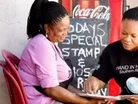Coca Cola & UN partner to empower African women

The collaboration aims to identify and address barriers women entrepreneurs are facing and provide women with business skills, leadership training, mentoring, peer networking skills and access to financial assets. This new programme is part of a broader partnership announced by The Coca-Cola Company and UN Women in 2011. The two organizations have pledged to reach more than 40,000 women in South Africa, Egypt and Brazil by the end of 2015.
With the support of local partner Hand in Hand, the programme aims to train a total of 25,000 women entrepreneurs, many of whom are running small retail businesses within the Coca-Cola value chain.
“Partnerships are an important lever for sustainable development. Empowering women contributes to building sustainable communities. We know that a woman’s income immensely benefits not only them but also their children’s education and other family needs. Empowering women entrepreneurs will benefit communities and future generations”, said Sadiq Syed, Deputy Representative and Officer-in-Charge, UN Women South Africa.
To date, approximately 4,500 women entrepreneurs in the Gauteng and North West province have received training in business skills such as daily record keeping, marketing and budgeting. The entrepreneurs also learned how to develop business plans and understand markets.
Initial results indicate the training programmes have already begun to stimulate business growth, and many participants are now able make better-informed decisions about their business, which can positively impact their families and communities.
One participant, 51-year-old Maphefo Ntshupetsang, supports herself and her five children by selling cold drinks, vegetables and snacks. The training has enabled her to separate business finances from personal finances, allowing her to budget for stock as well as save on a monthly basis. “Since joining the programme, I have managed to save money by buying in bulk. I now know that doing things alone in business does not pay. By interacting with other people you get new ideas,” she said.
Another participant, Ngoetsana Sehlabo, a 36-year-old mother, attributes her ability to keep records to the training. She is now able to analyse when she is making profits or losses. She has learned the need to separate personal and business expenditures and minimize both expenditures in order to save and reinvest in expanding her business.
The above emerging results are a testament that the partnership is contributing to the empowerment of women and communities at large.
“As a result of our partnership, we expect women participating in these programmes will have greater ability to establish and grow their businesses, increase their earnings and create new jobs in their communities. Their success will set an example for other women and create a virtuous cycle of re-investment in their families and communities,’’ said Vukani Magubane, Director of Public Affairs and Communications, Coca-Cola South Africa. Ms. Magubane concludes that “empowering women, one woman at a time, is the right thing to do for the sustainability of our communities.”
This new programme in South Africa is part of The Coca-Cola Company’s global 5by20 initiative, which aims to enable the economic empowerment of 5 million women entrepreneurs across the company’s value chain by 2020. Specifically, that means the small businesses the company works in over 200 countries around the world. From fruit farmers to artisans, this initiative aims to help women overcome the barriers they face to business success. At the end of 2012, nearly 300,000 women entrepreneurs throughout the world had been impacted by 5by20.
For more information, visit Coca-Cola Journey at www.coca-colacompany.com, or www.5by20.com.
Featured Articles
SAP has announced it has appointed a new President for a newly-created EMEA region, aiming to make the most of the opportunities of cloud and AI technology
Technology giant SAP has expanded its portfolio with the acquisition of LeanIX, a leader in enterprise architecture management (EAM) software
To help businesses achieve increased productivity, Siemens and Microsoft are deepening their partnership by showcasing the benefits of generative AI

